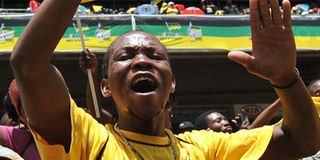Prime
Museveni salutes ANC liberation movement

South Africans attend the celebrations of the centenary of Africa’s oldest liberation movement, South Africa’s ruling ANC, with some 100,000 people at a rally in Bloemfontein. AFP PHOTO
What you need to know:
The banquet was attended by 15 Heads of State, two Prime Ministers and six former Heads of State.
KAMPALA
President Museveni along with other African leaders at the weekend hailed the continent’s oldest political liberation movement, the African National Congress, while marking its centenary celebrations.
The South African ruling ANC is believed to have inspired dozens of regional struggles for freedom—including President Museveni’s guerilla outfit (the National Resistance Army) that captured power in 1986.
According to a State House press statement released yesterday, President Museveni and other leaders also took part in the lighting of the Centenary Torch by President Jacob Zuma at the Wesleyan Church, Waaihoek, at the Inter-Faith Centre Church where the ANC was launched 100 years ago—precisely January 8, 1912. He is quoted in the press statement as saying: “Africans should have an insurance to guard their freedoms, just the way they individually ensure their safety. ”
The President, who travelled to South Africa on Saturday, also addressed the ANC membership and guests at the Centenary Banquet hosted by South African President, Jacob Zuma in Bloemfontein City.
Mr Museveni saluted the oldest African liberation movement for launching the Freedom Charter in 1959, which he described as “a master-stroke that was smart, correct and avoided racism but provided a correct diagnosis of our society.”
Meeting ANC
He said he first interacted with the ANC in 1955 when his Primary Three teacher taught them South Africa liberations anthem songs like Nkosi Sikelela.
Mr Museveni’s second interaction came in 1967 while at the University of Dar-es-Salaam where he said they formed a student solidarity group that identified with the Southern Africa Liberation Movements like the ANC, Mozambique’s FRELIMO and Namibia’s South West Africa’s People’s Organisation. But he actively got involved with the ANC in 1989, when the former South African President Thabo Mbeki, requested him to provide a home for ANC freedom fighters who were re-locating from Angola.
Since then, the two countries have worked together to promote continent’s co-operations and bilateral relations as well as learning from the former apartheid country’s experience in handling complicated struggles successfully and how to keep hope burning for a long time.
The ANC’s increasingly frail talisman Nelson Mandela, who was South Africa’s first black president in 1994, did not attend the celebrations for the centenary of the party he led to power after the fall of apartheid. “He is in good spirits but very, very old,” ANC chairperson Baleka Mbete said on Friday of the 93-year-old Nobel Peace Prize winner.
Poverty still on
However, South Africans are increasingly frustrated over allegations of corruption and the government’s failure to spread the benefits of their political victory more broadly. Thirty eight per cent of the locals still live in poverty.
President Zuma himself had to fight allegations of corruption shortly before assuming power in 2009. Cleared of the charges, he is now struggling to rein in feuding factions inside the party.
Worth noting is that the party has drawn praise for its economic management, rolling out new electricity and water supplies, as well as housing, and inspiring a new black middle class. But it has failed to give the poor the benefits of the post-apartheid boom.
Critics say too many people have been left to make do with shoddy public hospitals and schools, a dangerously high joblessness rate of 25 per cent, violent crime and a grim life in the shanty towns.




